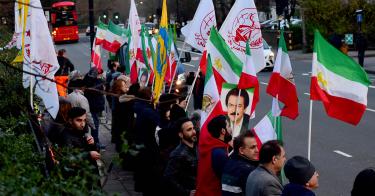It’s not its perceived “enemies” in the United States, in Israel or Saudi Arabia that Iran really fears — it’s a liberating counterrevolution to the repressive 1979 Islamic Revolution that Tehran’s thuggish theocrats really dread.
And rightfully so.
The people of Iran have lots of good reasons to be fed up with the regime’s tyrannical political, economic and social policies that it has meted out on them without their consent for nearly four decades now.
Just take a gander at the U.S. State Department’s annual human rights report to Congress. It notes that the Iranian regime is responsible for “severe restrictions on civil liberties, including assembly, association, speech, religion and press.”
The State Department’s report also documents politically motivated violence and repression, disappearances, arbitrary arrests — with prisoners being held sometimes incommunicado. Security forces, it charges, continue to act with impunity and invasions of privacy are common.
We also know that Iran is no democracy: Iranians don’t get to choose their government through open elections. The regime rules on who can run for political office — and you can bet every candidate is a loyalist.
The economy isn’t any better. The mullahs have mismanaged the energy-rich country horribly, bringing it from one of the most advanced economies in the Middle East in 1979 to one rife with hardship today.
While the free flow of information is limited, the Iranians probably aren’t that enthused about how their blood and treasure are being spent abroad in places like Syria, Iraq, Lebanon, Afghanistan and Yemen.
Protest chants such as “Not Gaza, not Lebanon — we will give our lives to Iran” and “Leave Syria, think of us” have been reported by the Middle East Media Research Institute.
The moolah the mullahs are spending on the wicked works of Hezbollah and Hamas or the government’s limited, but still ongoing, nuclear weapon and ballistic missile programs can’t sit well with Iranians in need.
It’s no wonder President Trump tweeted this week:
“Iran is failing at every level despite the terrible deal made with them by the Obama Administration. The great Iranian people have been repressed for many years. They are hungry for food & for freedom. Along with human rights, the wealth of Iran is being looted. TIME FOR CHANGE!”
That’s calling it like it is.
But the big question, of course, is what should the U.S. do about it? That could mean doing nothing, standing aside, remaining silent and letting Iranians sort things out — similar to the Obama administration’s approach during the 2009 protests.
While doing nothing is, in actuality, doing something, it shouldn’t be the course our nation takes — considering the threat the Iranian regime poses to not only human values, but to our security and that of our allies, friends and partners.
Instead, the U.S. should speak out forcefully on human rights in Iran — whether the protests continue or not. Our government should push other states to express their support for the Iranian people’s aspirations, too, especially from the major, democratic capitals of Europe.
We shouldn’t expect that the regime will relinquish its death grip on Iran, but it’s important that the Iranian people — and the world — understand that the United States backs their desire for political, social and economic rights and liberties.
There’s no question about it: It’s just the right thing to do.
This piece originally appeared in The Boston Herald



